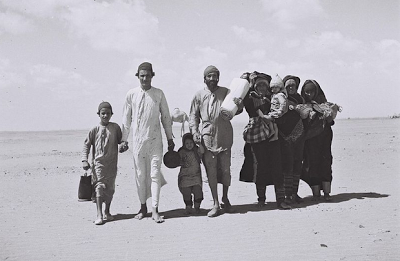
Powerful piece in the Huffington Post to coincide with the Memorial Day for Jewish Refugees from Arab lands, by Israeli of Yemenite parentage Shahar Azani and Emily Schrader.
Yemenite Jews on their way to Aden
From Yemen they fled, as they did from Iraq, Libya, Egypt and elsewhere in the Middle East. This year on November 30, Israel will remember the 875,000 Jewish refugees from Arab countries, who left everything behind, as they ran for their lives and returned home to the newly re-established State of Israel. While recognition within Israel is needed and welcome, this is not the case with the international community, so far failing to seriously acknowledge this issue, not to mention discuss reparations for the forgotten refugees.
Every year Kristallnacht is solemnly remembered – one night of virulent antisemitism which marked a turning point in the Nazi barbaric campaign of genocide against the Jewish people. Yet, even though so many ‘Nights of Broken Glass’ occurred all over the Arab world, those seemed to have escaped world attention. The history of persecution of Jews in Arab countries is an undeniable fact, yet we see no hint of an international community willing to address it, or even recognize its mere existence! Acknowledging the pain of so many who left so much behind as a key for future settlement seems to be a well established principle of conflict resolution, yet as far as Jewish suffering is concerned, this suddenly seems inapplicable.
Perhaps most importantly: why is it that despite centuries of expulsions, pogroms, land confiscation, apartheid laws and more, not a single Arab country has been held accountable for their heinous crimes against the Jewish people?!
Scholars dispute the exact amount, but value of property stolen from Jews is estimated to be between $6 and $100 billion dollars, with that in Iraq alone estimated at $30 billion in today’s values. In Egypt, Jews suffered immense persecution despite the fact they had a presence there which predates Islam. In the 1930’s and 1940’s Jews faced murderous riots that left hundreds dead. In 1948, the Egyptian government arrested thousands of Jews and confiscated their property without compensation. In the 1950’s, Egypt expelled 25,000 Jews confiscating all their property and permitting them only one suitcase leaving the country. Today there are less than a dozen Jews left in all of Egypt, yet the government has never apologized or been held accountable for their crimes.
The Egyptians were not unique in their persecution of Jews. In Iraq, Jews suffered numerous pogroms at the hands of pan-Arab nationalists, a Nazi supporting regime in the 1940’s, and radical Islamists. In the 1940’s, Iraq passed a series of apartheid laws against Jews confiscating their property, stripping them of citizenship, and forcing their businesses into bankruptcy. They were forbidden from attending the same schools as non-Jews, holding public office, and a myriad of other discriminatory laws. Jews were publicly hanged in the streets and accused of being Zionist “spies.” Over 100,000 Jews fled the country from 1948-1951. Today, Iraq has been completely ethnically cleansed of its ancient Jewish community.
In Syria, in the 1940’s and 50’s, the Syrian government emptied all Jewish bank accounts and confiscated all Jewish property. Jews were fired from all government positions, forbidden from traveling more than 3 miles from home, banned from having driver’s licenses, and from leaving the country. In Yemen, Jews were given a choice of converting to Islam or death. In the 18th century, the “Orphans Decree” was issued stating that Jewish orphans were to be taken and converted to Islam. This decree was reinstated in 1922. Today less than a handful of Jews remain in Yemen.
There are similar stories of oppression, especially in the 20th century, of Jewish communities in Morocco, Tunisia, Libya, Lebanon, Algeria, and even Iran. Remarkably, many of these refugees came home to Israel and miraculously built flourishing lives for themselves and all those around them. But the story of their oppression must be told if we are to pursue any chance of peace in the future.
Israel is not a perfect country, but for all the criticism of the Jewish state, it is one of the only countries where non-citizens (Palestinians for instance) can take a lawsuit straight to the highest court in the land, and win their case. Can the same be said of Iraqi Jews whose property was stolen? Of Egyptian Jews whose businesses were confiscated? Of millions of Jews from the Middle East who lost precious family members because of heinous anti-Semitism and Islamic extremism?! The issue before us is clear: How can there be true peace, without justice?

Leave a Reply